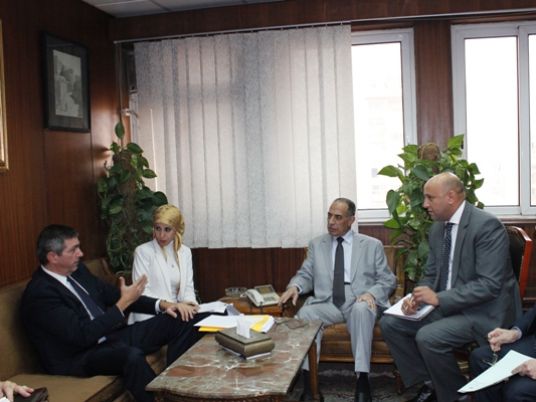
The image "western media organisations" reflect regarding death sentences issued in Egypt is "false", the justice minister told European Union Special Representative for Human Rights on Tuesday.
Justice Minister Mahfouz Saber met with Stavros Lambrinidis, the EU human rights representative, during the latter's visit to Cairo. The visit comes ahead of Egypt's Universal Periodic Review, set to take place at the United Nations Human Rights Council on 5 November.
Saber told Lambrinidis that there is a "mix-up" between the preliminary death sentences referred to Egypt's Grand Mufti and the ratified death sentences, according to a justice ministry statement.
The Mufti is Egypt's top religious authority. According to the Egyptian laws, his opinion on any death sentence must be sought before the court ratifies such sentences. The Mufti's decisions are not legally binding, although it is customary for the court to adopt them.
Saber said that even though a large number of defendants have been recently referred to the Mufti to consider their death sentences, "the number of those who received final death sentences is small." He added that death sentences in Egypt, like some "western" countries, are issued in accordance to the law.
A court in Minya has served over 1000 Muslim Brotherhood supporters preliminary death sentences in March and April 2014. The same court later ratified the death sentences of 220 of the said defendants after consulting the Mufti. The sentenced defendants included Mohamed Badie, the Muslim Brotherhood's supreme guide.
The mass death sentences have been widely condemned by a number of states, international bodies, and civil society organisations.
Lambrinidis also addressed preventative detention in Egypt, recommending that the duration of such detention be revised. Saber responded saying that "this is a domestic affair, to be revised by state institutions and the judiciary." He added that "it isn't possible for any external authority to interfere in such a matter."
The maximum duration of preventively detaining a defendant is two years, Saber said.
Former Interim President Adly Mansour nevertheless amended Article 143 of the Criminal Procedures Law in September 2013 in a manner which cancels the restrictions on preventive detention for defendants who receive a first degree verdict of life in prison or a death sentence. The amendment allows the duration of such defendants' preventive detention to be indefinite.
A new amendment to the Penal Code was also addressed by Lambrinidis. President Abdel Fattah al-Sisi amended in September Article 78 of the legislation in a manner which makes defendants accused of receiving funds with the purpose of "harming the state" subject to being sentenced to life in prison or death.
Such penalties only apply to "those who purposefully harm Egypt's interests," Saber said. He added that the penalties would only be applied when the charge is related to crimes which "harm the state's security."
Egypt summoned EU ambassadors commissioned to Cairo on 16 September to express its displeasure over the EU's statement on the situation in the country before the 27th regular session of the United Nations' Human Rights Council.
The EU had said that it "continues to be worried about the deteriorating Human Rights situation in Egypt marked by indiscriminate detentions and disproportionate sentencing – including the death penalty."




